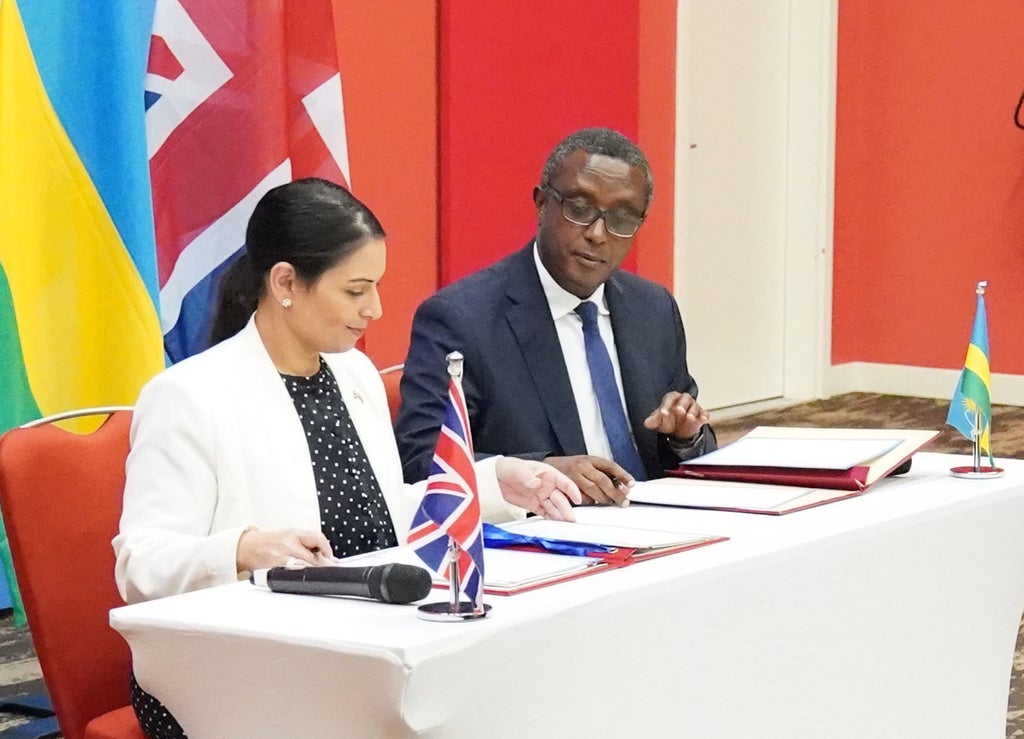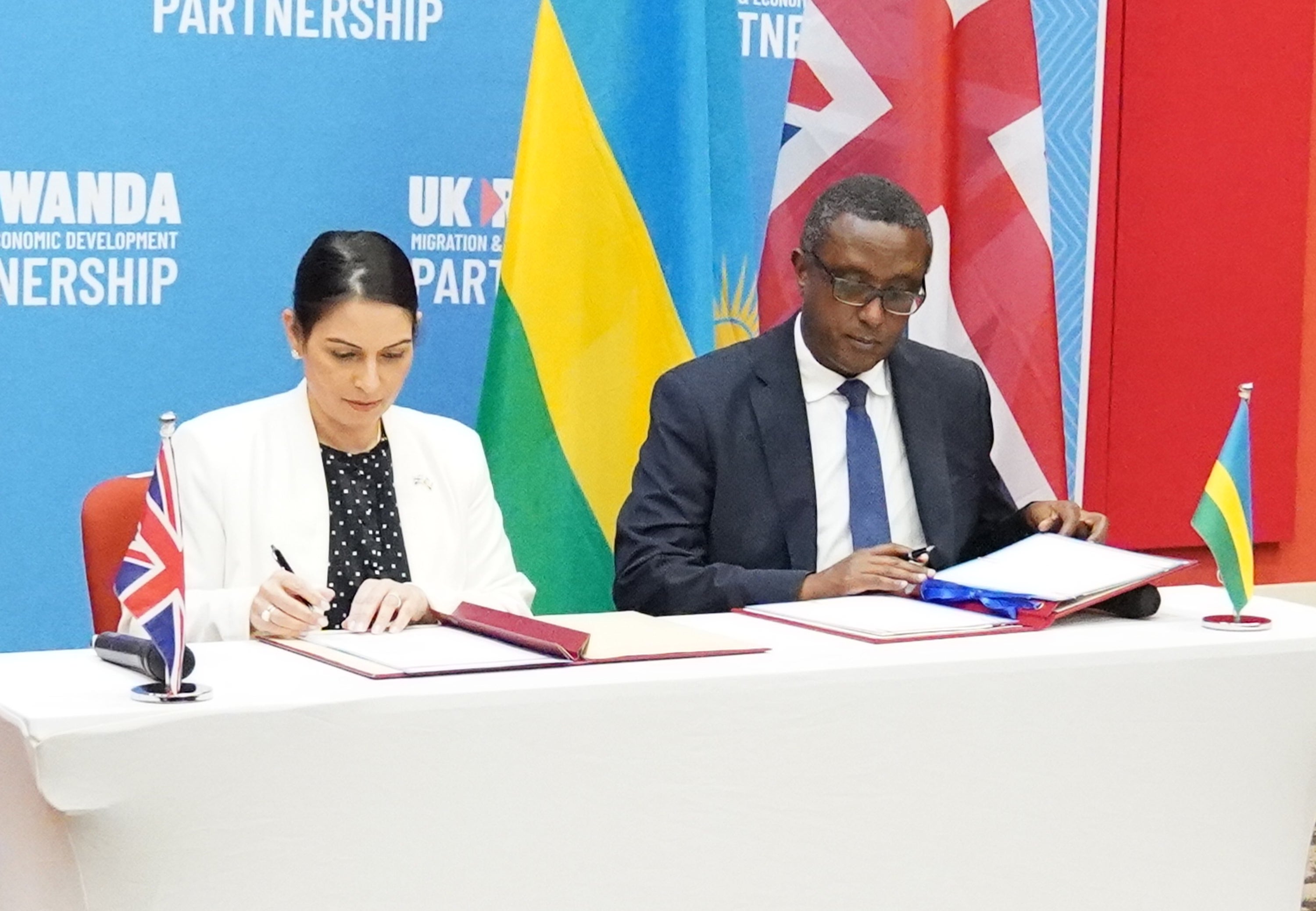
Asylum seekers in Rwanda are sometimes forced to wait years for a decision and two-thirds are ultimately rejected, according to a Home Office report.
As Priti Patel’s plans get underway for migrants seeking refuge in Britain to be shipped 4,000 miles away to have their claims considered, a new assessment published by the department highlights shortcomings in the Rwandan asylum system.
As well as delays and a high refusal rate, the document cites evidence that both LGBTQ+ people and individuals from the Middle East face discrimination in the asylum decision-making process, with these groups more likely to be rejected.
And it quotes sources saying that those who are granted refugee status face barriers to finding employment, forcing many refugees to turn to informal work, with some subsequently pushed into exploitation.
Ms Patel has said the UK’s £120m deal with Rwanda will enable deportees who are granted asylum there to “build their lives” in the country and will “ensure protection for the genuinely vulnerable”.
The Home Office’s country guidance on Rwanda’s asylum system, published on Monday, quotes the UN’s refugee agency (UNHCR) saying that while asylum decisions in the country should take 45 days, this “often doesn’t happen”, with people sometimes waiting up to two years.
Officials from the UNHCR - which supports asylum seekers and refugees in the country - state that in 2020, there was only one eligibility officer assessing all of Rwanda’s asylum cases, citing a lack of capacity and decision-makers not always having adequate training.
The report reveals that in 2019, two-thirds of asylum seekers in Rwanda - 62 of 124 - were refused refugee status. Just 24 of those who were refused appealed the decision, and two of these led to the decision being overturned.
The document also states that interpreters are not provided for asylum seekers during their interviews, quoting the Rwandan immigration directorate telling the UK government on 22 March 2022 that “claimants are able to arrange their own interpreters”.
The UNHCR says that reasons for asylum refusals are “not properly explained including to the asylum seekers”, according to the report.
The organisation adds: “No further reasons for the decision are provided, which renders the right to appeal against a negative decision difficult or impossible to exercise in practice.”
On top of the initial £120m paid to Rwanda under the deal, the Home Office has said the UK will provide funding for asylum caseworkers, access to legal advice, translators and a “comprehensive integration package”.
However, the UNHCR’s UK spokesperson told the Independent it remained “gravely concerned” about the agreement.
“Rwanda does not have the capacity to receive increased numbers of refugees and fairly and efficiently determine their claims or provide long-term solutions,” they added.
The country guidance also cites concerns raised LGBTQ+ asylum seekers in Rwanda have “faced challenges” in registering asylum claims.

It states that the UNHCR has raised concern that “some asylum seekers, particularly lesbian, gay, bisexual, trans and intersex persons, faced challenges when attempting to submit asylum claims, with requests being verbally rejected”.
The report also suggests that the decision-making process may discriminate against asylum seekers from countries that are not in close proximity to Rwanda.
It quotes the UNHCR as saying: “There is a tendency to grant asylum to those from neighbouring countries; rejection rates are higher for people from Middle Eastern and other countries.
“There is a view they should go to neighbouring safe countries – they don’t see there is a protection need. Sometimes they also don’t see some refugees can be sur place refugees.”
Under a section on employment, the report indicates that people who are granted refugee status in Rwanda may go on to face discrimination and potentially exploitation when they try to find work in the country.
“Sources noted non-legal barriers exist which hinder refugee access to employment and self-employment,” the Home Office report states.
“Many employers, for example, are unaware of the legality of employing refugees and are unfamiliar with the refugee ID card, which results in many refugees turning to informal employment.”
It quotes the UNHCR as saying: “When it comes to the general public, unemployment is still high in Rwanda. There is competition between the local people and refugees, with a tendency to recruit local people.”
The report also quotes Rwanda’s legal aid forum as saying: “Refugees are allowed to work but are exploited and not paid the same and find it very hard to find employment. They are often denied contracts.”
Bella Sankey, director of Detention Action, which has launched a legal challenge against the policy, said: “On the government’s own evidence Rwanda’s asylum system would be totally unable to guarantee justice and protection to some of the world’s most traumatised people."
Sonya Sceats, chief executive of Freedom from Torture, which is also pursuing legal action, said: “Our concerns about the safety of this cruel scheme for people fleeing torture and war have only increased and we will continue to press for judicial scrutiny.”
Yolande Makolo, spokesperson for the Rwandan government, said it was “untrue” that some asylum claims in the country took two years to be decided, saying all claims were handled within 30 days after submission.
“Given the additional resources being invested in this partnership we are confident that everyone will be processed in a timely manner,” she added.
She said no refugee had been refused on the basis of their sexuality or nationality and that, regardless of whether asylum seekers have their claims accepted, they will be “afforded the same opportunities to live, work and become members of our society”.
A Home Office spokesperson said: “As part of the partnership, the UK is providing an initial investment of £120m to boost the development of Rwanda, including jobs, skills and opportunities to benefit both migrants and host communities.”







